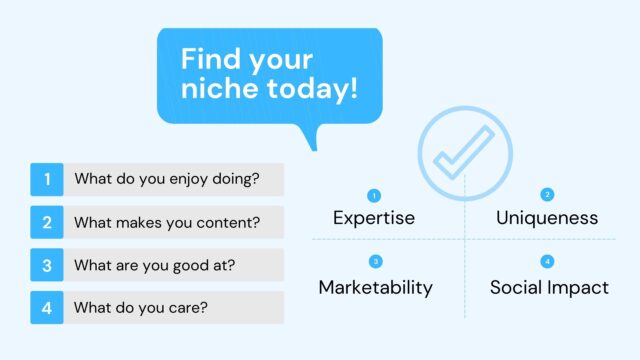I’m a Japanese living in London. I’m very please to see the Japanese term “ikigai” being used a lot in English these days.
When I could no longer use the tools that I had been using in my life during the pandemic, I seriously thought about what my “Ikigai” was and also explored various methods to discover it.
In this article, I would like to talk about what Ikigai is, which has its roots in my home country Japan and how you can find it, along with specific steps that I myself took.
What is Ikigai?
Ikigai is a Japanese concept that roughly translates to “a reason for being” or “a reason to wake up in the morning.” It represents the intersection of four elements: what you love, what you are good at, what the world needs, and what you can be paid for.
According to this concept, finding your Ikigai involves discovering activities or pursuits that fulfill all of these elements, leading to a sense of purpose, satisfaction, and fulfillment in life. It’s a holistic approach to understanding one’s purpose and finding meaning in daily life.
Criteria of Ikigai
The concept of Ikigai involves the intersection of four key elements. They are…
What you love (Passion)
This refers to activities or pursuits that bring you joy, fulfilment, and a sense of purpose. It involves identifying the things that you are deeply passionate about and that make you feel alive.
What you are good at (Vocation)
This relates to your skills, talents, and strengths. It involves identifying the things that you excel at and that come naturally to you. This could be anything from artistic abilities to problem-solving skills to interpersonal skills.
What the world needs (Mission)
This refers to the needs, problems, or challenges in the world that resonate with you. It involves identifying how you can make a positive impact or contribute to something greater than yourself. This could involve helping others, solving societal issues, or contributing to the greater good in some way.
What you can be paid for (Profession)
This relates to the practical aspect of sustaining yourself financially. It involves identifying how you can leverage your passions, skills, and contributions to generate income or support yourself financially.
When these four elements intersect, they form your Ikigai – your reason for being or your sense of purpose in life. It’s important to find balance and alignment among these elements to achieve a fulfilling and meaningful life.
How to Find Ikigai?
Ask who you are
While reading articles about how to find yourself, I asked myself who I am brutally. It can be difficult to directly answer the question of who you are, so take a moment to break it down and ask yourself the following four questions.
- What do you enjoy doing?
- What fills your heart?
- What are you good at?
- What are you obsessed with for no reason?
The starting point is to answer as honestly as possible without being pretentious. It doesn’t matter what others would think, so try writing down everything that comes to mind on paper. It doesn’t have to be something big. It doesn’t have to be something with a physical form. List the things, words, and things that resonate within you for some reason.
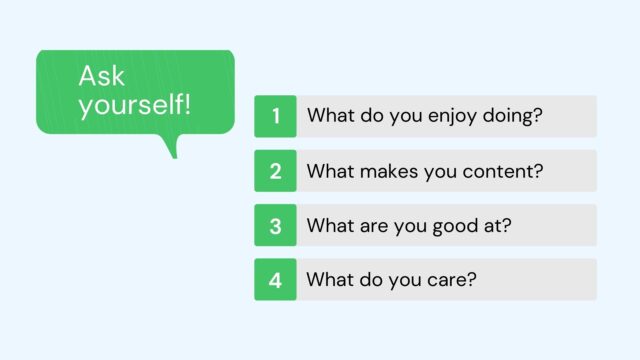
Write down anything that comes to your mind
My note contained the following items:
- Journey
- things to learn
- communication
- science
- journalism
- Video production
- minimalism
- Simplification
- being Japanese
I just wrote it down as it came to mind. From what I studied at university, what I did and do at work, my lifestyle, people around me, my values, and my origins. Try to look at yourself from various angles of the present, past, future, and the whole life.
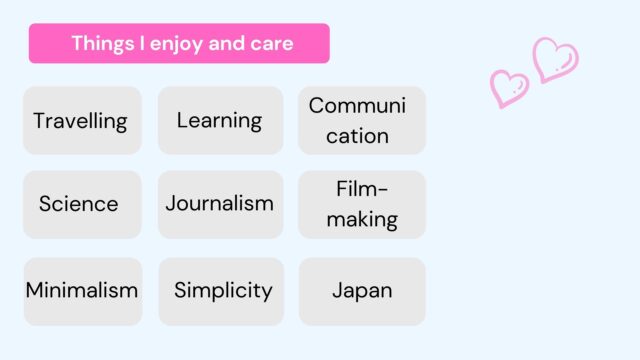
Combine what you have written
Once you’ve done that, you can start combining the words you’ve written down randomly to try and develop new ideas and concepts. For example, you can come up with a new career of “language coach” by combining “travel,” “learning” and “communication” from my list.
Alternatively, you could consider adding “science” + “journalism” + “video production” to become a “science producer.” It might be possible to follow in Marie Kondo’s footsteps by combining “minimalism” + “simplification” + “being Japanese”!!
Try combining three or more of the things from the list, and try to see if you can come up with as many ideas as possible from as many combinations as possible. It doesn’t have to be a perfect fit at this point, trial and error is also part of it.
Combining multiple things is a very convenient way to think about your own specialty based on your individuality or uniqueness. In this way you can think of a new career that covers three or more of the things you like, and equally you can reduce your competition as it becomes more of niche.
Don’t you think that being the world’s best science documentary producer has less competition than being the world’s best scientist or the world’s best film director? You will definitely be more competitive if you leverage your strengths and compete with your niche that only you can create as well.
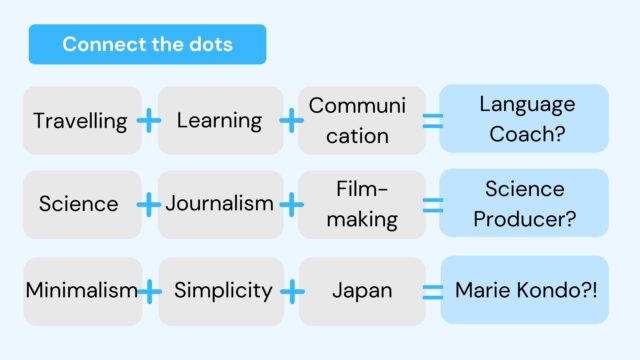
Sift through the conditions
In order to make new ideas created from combining things from the list unique to you, you need to sift them through the criteria of Ikigai to be a little more selective. So what kind of sieve should we use?
In my opinion, there are four conditions.
- Do they have at least above-average expertise?
- Does it have enough uniqueness to differentiate it from others?
- Is it marketable to make money?
- Is it something that can have an impact on society?
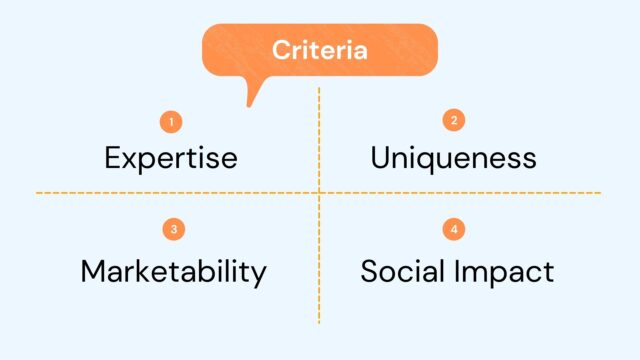
First, regarding expertise, if you are a teenager, I don’t think you need to worry about it too much. There is still time and opportunity to expand your expertise. However, if you are over 30, I think there is no reason not to use your educational background and work experience. It is much more efficient to start from a certain basis you already have and just make some adjustment or improve your skills than to completely change direction and re-learn everything from scratch.
Uniqueness also ties into tactical competitiveness. Your unique Ikigai allows you to have a strong sense of belonging, and at the same time, because it is niche, you can reduce your competition.
Marketability speaks to the purpose of branding. You’re going to make something you love your own brand, so what better than to make money while doing it? Therefore, I would like to choose something that I can sell or that will get people to invest in me.
Lastly, social influence will help you maintain your motivation, and the significance of working on it will become clearer, and connections with the community around you will often create a virtuous cycle, so be sure to consider it. This is a standard I would like to keep.
This is it! This is what makes me unique!
Do you feel that? After repeating the above process many times, I finally arrived at my new Ikigai.
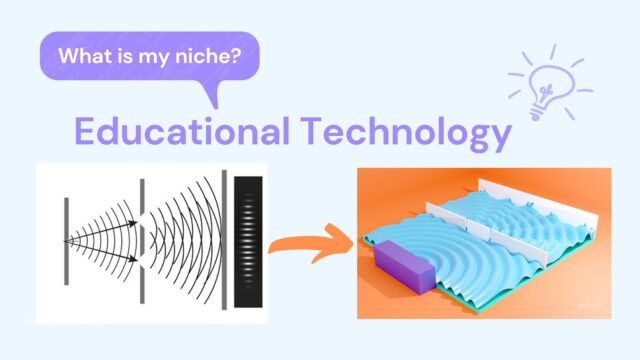
“Educational Technology”
I have no prior experience in the field of educational technology, but after passing through the Ikigai sieves above, I was convinced that this is the way to go.
First of all, in terms of expertise, I had a master’s degree in science and technology studies, and I thought I had some knowledge of visualising content using the latest media through my experience in the television industry. Of course, I didn’t have sufficient expertise, but I thought I had something that could serve as a foundation for further development of knowledge.
Regarding its uniqueness, we aimed to further differentiate it as a technology for science education. Compared to educational technology in the language field, educational technology in the scientific field can be said to be niche.
Needless to say, it is a rapidly growing industry field worldwide, along with the fintech (financial technology) and medtech (medical technology) fields.
Furthermore, the social background was that the coronavirus pandemic has increased the demand for online and remote educational tools. Edtech has the potential to support people in various situations around the world, not just during the pandemic.
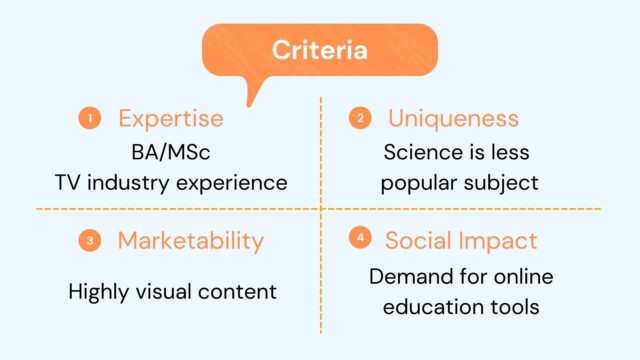
Does it cover a lot of things you like?
I know I’m being a bit lofty here, but if you go back to the list of things I like and am passionate about, you’ll understand why educational technology is a good fit for my branding. .
Visualizing scientific knowledge is also an important theme in science education technology, so creating videos, writing content, and communicating are important tasks.
Furthermore, since it is an effort to improve educational efficiency by simplifying thinking, I can work on it based on my favorite way of thinking. You can also bring the identity of Japan, which is both an anime and technology powerhouse, into your new branding.
The field I chose as my new identity, my brand, and my new specialty encompassed most of the things I love! I thought that only the “travel” element was missing, but there are actually opportunities to travel for academic conferences, etc., so it may not be an exaggeration to say that it covers everything.
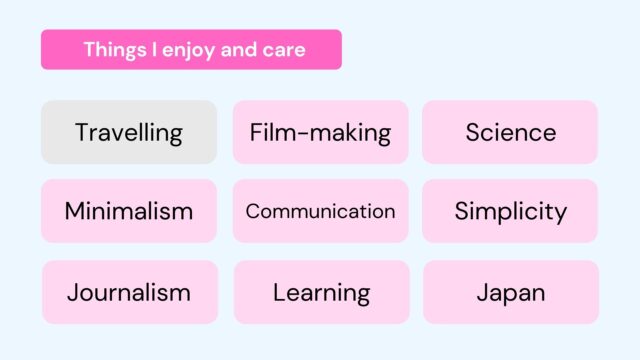
Summary
Based on the identity I discovered in this way, I am currently pursuing a doctoral program in the field of educational technology in order to carry out this new branding. If you don’t know who you are, don’t know what your specialty is, don’t know who you are, or want to have something that you can call your own brand, please use the process introduced in this article to find yourself. Please try it.
The picture of you that emerges from this may be completely different from what I discovered, but honestly facing the question of who you are will definitely give your life a deeper meaning. I think it’s something you can give me.
Please start by writing down what you like and what you are particular about!
